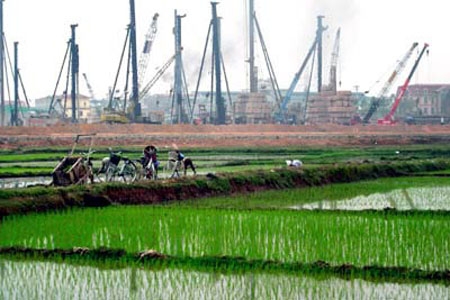INDOCHINA INTERNATIONAL CONSULTING CO., LTD
HO Add: 62L/36 Nguyên Hồng, Ward 11, Bình Thạnh District, HCMC - Vietnam
Biz Office Add: #48 Road No 11, Quarter 6, Hiệp Binh Chánh Ward, Thủ Đức, HCMC - Vietnam
®Source: http://viipip.com should be clearly quoted for any use of information extracted from our website.
Publication permit No: 60/GP-TTĐT , April 05, 2010.


In 2010, 93,000ha of land were allocated for IP construction, compared to just 44,000ha approved by the National Assembly
Many cities and provinces in Vietnam have been racing to build industrial parks (IPs), ignoring land use and environmental issues.
This was one of the problems raised at a conference held by the National Assembly Economic Committee to seek the opinions of ministries and agencies concerning land use, through the year 2015 and planning through 2020.
In 2010, 93,000ha of land were allocated for IP construction, compared to just 44,000ha approved by the National Assembly.
In a number of areas, average IP occupancy rates are below 50 per cent, yet officials continued to approve the construction of more.
Land waste, fiscal waste
According to the Ministry of Planning and Investment, by the end of December 2010, Vietnam set up 260 IPs. Nearly $9 billion has been poured into infrastructure development for the parks.
Despite contributing 20 per cent to the country’s total annual export value and generating more than 3.2 million jobs, industrial parks also take up a lot of land, causing land use issues.
Dang Kim Son, Head of Institute of Strategy and Policy for Agriculture and Rural Development under the Ministry of Agriculture and Rural Development, said there has been a decrease in agricultural land. Currently the country does not have a problem with food supply, but it may become a problem during natural disasters, which are becoming more likely due to climate change, he said.
He suggested that the allocation of agricultural land must be closely watched.
To date, IPs across the country have licensed around 4,400 domestically-invested projects totaling $16.2 billion, but only 40.5 per cent of this has been disbursed.
As many as 4,000 foreign companies have invested in IPs with a total investment capital of $53.6 billion, of which, a mere 32 per cent has been disbursed.
Former Deputy Head of the National Assembly Economic Committee Le Quoc Dung, said localities should carefully select projects before allocating land, adding that priority should be given to those projects which use the least amount of land, have high economic efficiency and use clean-technology.
The outdated technology at many IPs also lead to environmental problems. According to Sai Gon Giai Phong Newspaper, the Mekong Delta region has 111 industrial parks, many of them discharging untreated waste water.
- FDI capital continues to pour into Vietnam (6/11/2025 1:20:33 PM)
- Thanh Hoa receives good news: Preparing to have an additional industrial park of up to 470 hectares, creating jobs for nearly 30,000 people (6/11/2025 1:15:09 PM)
- Industrial Park Real Estate: Waiting for the New Generation of FDI (6/11/2025 1:10:15 PM)
- A wealthy Vietnamese city will have two special economic zones after the merger (6/11/2025 1:04:42 PM)
- 30 billion USD capital FDI in Việt Nam by 2025, a series of "ông big" races to expand the land fund (6/11/2025 12:55:26 PM)
- the 2nd largest city in the North will start construction on an international economic zone (6/11/2025 12:50:20 PM)
- Japanese giant Sumitomo continues to want to build an industrial park in the countrys fourth smallest province. (6/11/2025 12:40:45 PM)
- 3 foreign corporations want to invest billions of dollars in Ba Ria - Vung Tau (6/11/2025 12:34:30 PM)
- Lotte Group member starts construction of nearly 1,000 billion VND logistics center in the province with the most industrial parks in Vietnam (6/11/2025 12:33:26 PM)
- Forming a regional center for manufacturing spare parts and components (6/11/2025 12:24:08 PM)
- Vietnams first wafer factory is about to start construction (6/11/2025 12:19:09 PM)
- Dong Nai attracts foreign investors (6/11/2025 12:13:27 PM)
- Tay Ninhs largest industrial park welcomes a $150 million high-end knitted fabric factory project (6/11/2025 12:11:00 PM)
- (6/11/2025 12:09:10 PM)
- Vietnam will become a destination for Chinese investors in the future (11/6/2023 1:03:19 PM)

- FDI capital continues to pour into Vietnam
- Thanh Hoa receives good news: Preparing to have an additional industrial park of up to 470 hectares, creating jobs for nearly 30,000 people
- Industrial Park Real Estate: Waiting for the New Generation of FDI
- A wealthy Vietnamese city will have two special economic zones after the merger
- 30 billion USD capital FDI in Việt Nam by 2025, a series of "ông big" races to expand the land fund










 ADB: Vietnam’s 2009 GDP growth to be highest in South East Asia
ADB: Vietnam’s 2009 GDP growth to be highest in South East Asia MGM Grand Ho Tram: Vietnam’s First ‘Las Vegas Style’ Integrated Resort
MGM Grand Ho Tram: Vietnam’s First ‘Las Vegas Style’ Integrated Resort Nha Trang’s Twin Towers project licenced
Nha Trang’s Twin Towers project licenced Foreign investors still have good opportunities in Vietnam
Foreign investors still have good opportunities in Vietnam Sierra Wireless gets a foot in Vietnam’s ICT market
Sierra Wireless gets a foot in Vietnam’s ICT market